Book contents
- Frontmatter
- Contents
- Notes on contributors
- Acknowledgements
- List of abbreviations
- Sir John Elliott: an appreciation
- Introduction
- PART I Power and propaganda: the world of the court
- PART II The pattern of society: community and identity in Habsburg Spain
- 4 Toledanos and the kingdom of Granada, 1492–1560s
- 5 Castile, Spain and the monarchy: the political community from patria natural to patria nacional
- 6 Aragonese constitutionalism and Habsburg rule: the varying meanings of liberty
- 7 Patriotism in early modern Valencia
- 8 The mental world of Jeroni Pujades
- 9 Centring the periphery: the Cerdanya between France and Spain
- PART III Spain and its empire
- Index
6 - Aragonese constitutionalism and Habsburg rule: the varying meanings of liberty
Published online by Cambridge University Press: 04 August 2010
- Frontmatter
- Contents
- Notes on contributors
- Acknowledgements
- List of abbreviations
- Sir John Elliott: an appreciation
- Introduction
- PART I Power and propaganda: the world of the court
- PART II The pattern of society: community and identity in Habsburg Spain
- 4 Toledanos and the kingdom of Granada, 1492–1560s
- 5 Castile, Spain and the monarchy: the political community from patria natural to patria nacional
- 6 Aragonese constitutionalism and Habsburg rule: the varying meanings of liberty
- 7 Patriotism in early modern Valencia
- 8 The mental world of Jeroni Pujades
- 9 Centring the periphery: the Cerdanya between France and Spain
- PART III Spain and its empire
- Index
Summary
On 30 January 1576 a tense meeting took place in London between William Cecil, Lord Burghley, and Antonio de Guaras, a Spanish merchant who served as a vital means of communication between London and Madrid since the two governments had broken diplomatic relations in 1569. The reason for the meeting was the offer that Queen Elizabeth had received to put herself at the head of the States General of the Low Countries, a possibility which naturally concerned the Spanish authorities. Guaras argued that Elizabeth should not become involved in these affairs, but rather concern herself with France and Scotland, her traditional enemies. Once order was re-established in the Low Countries, Guaras said, England would have nothing to fear. Further, Guaras protested that the Spaniards were being called foreign intruders with regard to the Low Countries, a manifest error since, as he reminded his interlocutor, these were patrimonial states of the Spanish crown.
Burghley imparted a new tone to the conversation by referring to the harshness of Spanish dominion and affirming that Holland and Zeeland would cling doggedly to their privileges, like Aragon. They would succeed, he said, with the assistance of neighbouring countries, since one of these privileges was that if the king violated the constitution another prince would be elected. Guaras retorted that, regarding Aragon, it was necessary to view the case on its merits: Aragon was originally a free dominion, where the king was elected by the people on the condition of defending their privileges.
- Type
- Chapter
- Information
- Spain, Europe and the AtlanticEssays in Honour of John H. Elliott, pp. 160 - 187Publisher: Cambridge University PressPrint publication year: 1995



